Paddle steamer
Built in 1911
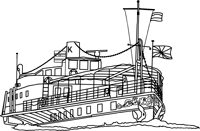
Kapitein Anna
Historic timeline
partyboat
hotel & restaurant
The Kapitein Anna cruised for years as Kapitein Kok and was built in 1911 for the Steamboat Reederij op de Lek as paddleboat 6 and sailed from 1911 until the service in 1948 was lifted. The boat maintained a regular service for passenger and freight transport between Culemborg, Schoonhoven and Rotterdam and intermediate places. After a life as a partyboat she was renamed Kapitein Anna in 2013 and became a hotel annex partyboat / hotel.
Read more here below about the history of Kapitein Anna, formerly known as Kapitein Kok or take a look at a historic video about the last cruise of Kapitein Kok in a scheduled service.
Timeline
The beginning
-
1911-1948
-
1911
Liner on the Lek and Nieuwe Maas
The Kapitein Kok was built in 1911 at J & K Smit in Krimpen aan de Lek with construction number 629 for the Stoomboot Reederij on the Lek (SRodL) as paddle steamer no. 6. The boat maintained a regular service for passenger and freight transport on the Lek and Nieuwe Maas between Culemborg, Schoonhoven and Rotterdam and intermediate places. At that time, 1200 passengers were allowed on this scheduled service boat. First No. 6, she was later renamed Kapitein Kok as a tribute to the last captain, Teunis Kok from Schoonhoven.
Significant capacity
The paddle steamers had a not insignificant capacity. The No. 4 (ex 'Culemborg' from 1897) and the No. 6 were registered for 1200 passengers and 100 tons of freight and cattle. However, it happened that upon arrival in Rotterdam in 1944 and shortly after the liberation in 1945, up to 1400 passengers were disembarked! The crew sometimes had to prevent with clubs that too many people would stand on one side of the ship, which would put stability at risk! For 25 cents one could already go to Rotterdam. The transport of cows and oxen cost fl 1.10 and for fl 1.65 it one could take his horse with him ...
Crew & passengers
There were about 10 experienced crew members who also slept on board (captain, helmsman, engine-driver, fireman, 2 servants, 2 conductors, a steward with 1 or 2 assistants). The cargo was taken on the foredeck and often consisted of cattle, cheese, flour, milk, skins, peas and beans. The cows were also milked on board by the crew.
The second-class passengers were also on the front deck, but also had the option to stay inside the front. The salons on the stern were intended for the first class passengers, as well as the aft and in good weather the aft deck and panorama deck. The salons were luxuriously furnished with plush and copper lamps. There were even toilets for the ladies and gentlemen. Most passengers, however, traveled second class and had to do with toilets for men and women together. For the service of the passengers, a steward was usually assisted by his wife and a maid.1914Electric light
From 1914, the oil lamps on No. 6 were replaced by electric lamps. Smoking was allowed, provided the pipe was fitted with a cap, this was because of the fire hazard.
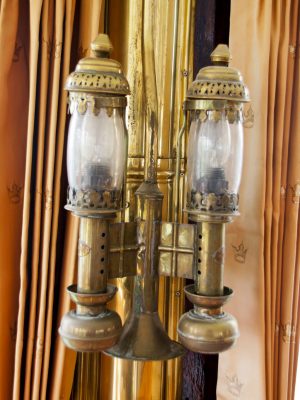
The village life along the flood plains
The entire village life in the flood plains along the river was interwoven with the Reederij op de Lek. A boat trip to the city was an experience for a child. When you stood behind the church, you saw the boat approaching stately. She crossed the river, awaited by the ferryman who fastened the moorings. After the passengers reached their destination they went over the gangway and were in a different world. A world that smelled like rope through the big rolls that were transported as freight and mixed with the smell of steam and coal that rose from the engine room.
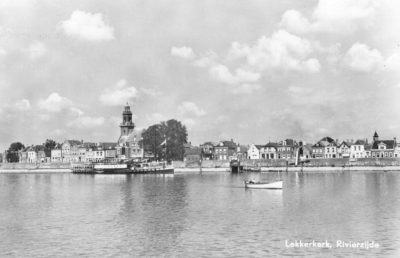
Life on board
In the passage to the stern was a large brown drinking water tank with a tap underneath and a chain with an enamel drinking cup with which you could quench your thirst. In the summer, 2nd class was on the front deck under the awning, sometimes between freight and cows or in the forecastle where the buffet was. Hooks hung from the ceiling where the staff of the boat attached the hammocks at night to spend the night. The stern formed the 1st class. In the back there was always a cozy atmosphere of people who were talking, playing cards or checkers. Especially on market days it was very busy there.
Variety on the way
On the deck and promenade deck were the salons, which offered a beautiful view over the river. Bad weather conditions brought variety in the route of travel. Suddenly emerging fog occasionally forced the captain to anchor in between two berths. You had to wait and see when the journey could be continued. If there was a lot of drift ice in the winter, the paddle boats could not sail. High water level showed a different picture. The jetties were then under water and the passengers were carried by the personnel of the boat. This attracted a lot of attention and many a hurray went up if the carriers sometimes could not keep a lesser seen passenger, so he ended up in the water.
May days 1940Evacuation trips at the start of the Second World War
In the May days of 1940 war violence forced many residents of villages along the Lower Rhine to evacuate to villages in the Lower Lek. This mainly concerned residents of Rhenen, Wageningen, Opheusden and Kesteren and the sailing destinations were mainly Lekkerkerk and Krimpen aan de Lek. This happened with Rijnaken. A few weeks later, return trips were carried out and here are the paddle boats Nos. 5 and 6 of the SRodL involved.
1 maart 1948Reedery on the Lek disincorporated
It was a time when the competing buses and also the trains could not yet achieve full service due to lack of vehicles and materials. But the golden age for the cumbersome steamers had passed, a development that had already been set in motion before the war. On March 1, 1948 (last sailing day, February 29) the Reederij on the Lek finally abolished its Lekboot service, because road transport became cheaper than the steamer service.
-
1950-1976
-
June 1950
As Kurpfalz in Ludwigshafen
The last captain, Teunis Kok from Schoonhoven or Captain Kok is also the one who, after the ship has been taken out of service, the No. 6 personally transported to Ludwigshafen-Mannheim in June 1950, initially to be demolished, but eventually establish as a floating restaurant, ripper ship and pilot station KURPFALZ.
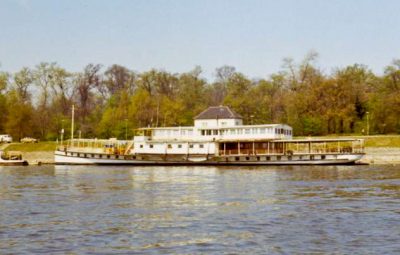 1976
1976In 1950 the new owner Karl Pister in Ludwigshafen gives the boat the name KURPFALZ, carried out a number of fast renovations and made a guesthouse (with dancing and brothel) and also a pilot station of the ship. Machine, boiler and wheels were removed and eventually the boat ended in a neglected state. How long the Rhineguesthouse Kurpfalz has existed is unknown. But it is known that the ship was discovered in 1976 by Wijnand Key (musician from Hilversum) in Ludwigshafen. Key decided to buy the ship, rusty and neglected, and when it was certain that the ship could be refurbished she was towed to Muiden.
-
1976-2013
-
1976
History Kapitein Kok
When Wijnand Key bought the ship in 1976, an inland shipper brought the ship alongside his own ship to Muiden, where it was restored at the former shipyard Schouten.
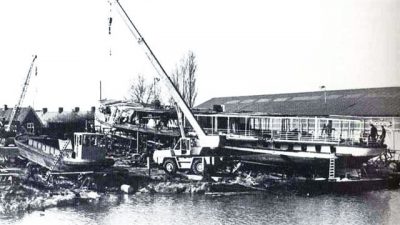 1977 & 1978
1977 & 1978Scheduled services
In the summers of 1977 and 1978, Kapitein Kok operated regular services from the home port of Amsterdam, Rotterdam, Utrecht, Gorinchem and Dordrecht. In the summer of 1979 this was for example Amsterdam - IJmuiden over the North Sea Canal. These liner lines are no longer continued and since then only charter trips have been made.
1977Steam engine replaced with hydrolic engine
Originally the Kapitein Kok's wheels were driven by a steam engine. During the renovation in 1977, this drive was replaced by providing each wheel with a hydraulic motor. To compensate for the weight of the heavy steam engine, a thick concrete slab has been poured into the engine room.
2000-2005Over Water Foundation
In order to give the public more opportunity to get acquainted with and take part in this special paddle wheelboat, on the initiative of the Over Water Foundation of 2000-2005, a number of 'historic cruises' on the Lek were organized annually, as well as in December 2011 on the occasion of its 100-year jubilee trip. There was great interest in this. The Kapitein Kok also visits the large biennial event 'Dordt in Stoom' in and around Dordrecht where, despite the lack of a steam engine, the well-preserved historic character of the ship is a worthy guest. The expansions of the superstructure on the main and upper deck since the restoration in 1977 have not affected this historical character.
1987-1988New owners
In 1987-88, Wijnand Key transferred the Radersalonboot Kapitein Kok BV to his son Martin Key, who continued the operation until 2002, after which she had several owners and eventually went bankrupt in 2012. From the bankruptcy, shipping company Quo Vadis bought it at an auction in 2013 and converted it from June 2013 to April 2014 to Kapitein Anna..
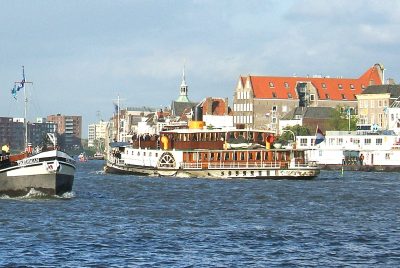
-
2013-present day
-
juli 2013
Conversion to Kapitein Anna
Named after the mother of owner Ton Schellekens 15 man have been working very hard at the Kapitein Anna at shipyard Brouwer in Zaandam and since July 2013 in the Zuiderzeehaven near Kampen to get Kapitein Anna ready in time for Sail Kampen during Easter 2014.
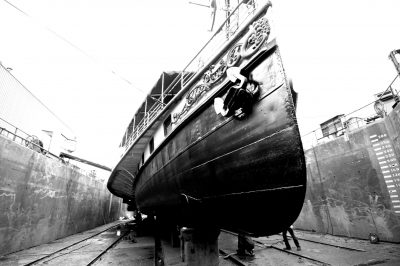 Pasen 2014
Pasen 2014Kapitein Anna in service
Everything has been thoroughly addressed, which was desperately needed, so that she can be used again for a long time! The panoramic salon has been refurbished with, among other things, a fixed roof and the salons in the hold have been replaced by 12 beautiful cabins with 22 berths and each with their own bathroom with toilet, shower and sink.
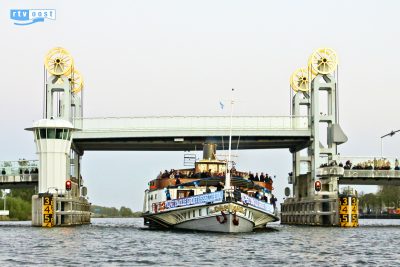
-
20.04.2014 Sail Kampen: Maiden trip
